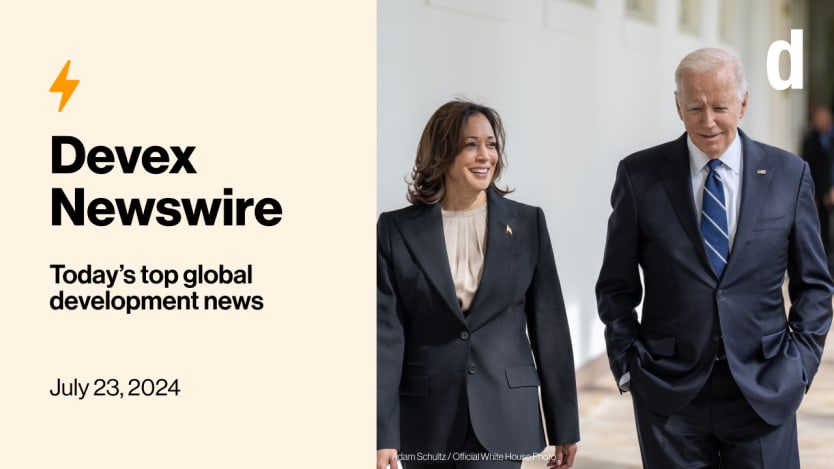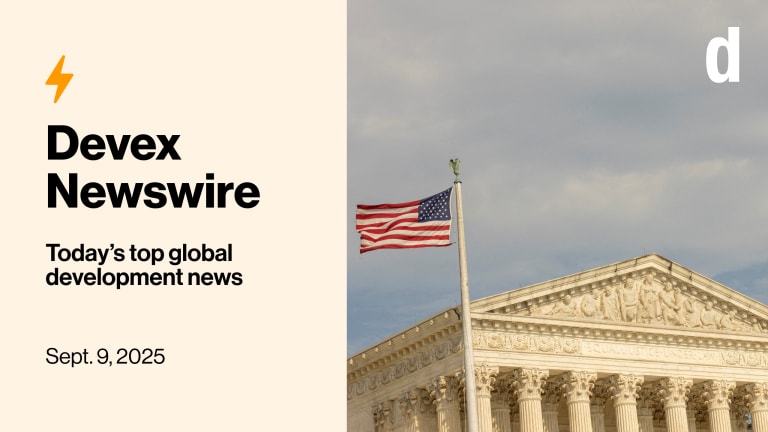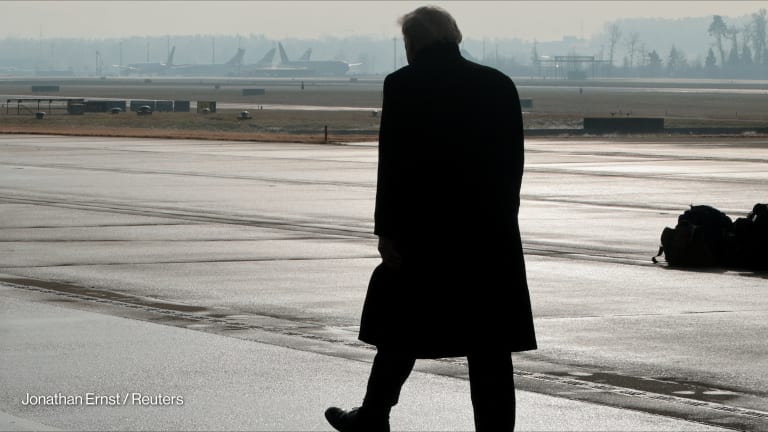
One of the leading voices in U.S. politics offers insights into Joe Biden, Kamala Harris, Donald Trump, and the presidential race that could upend U.S. development.
Also in today’s edition: For many people, AI might as well stand for abstract intelligence. The technology just isn’t tangible yet — but it’s here and it’s not going anywhere. So for Day 2 of Pro Week, we have practical stories on who’s already using artificial intelligence, plus a piece on the race to control the next iteration of the internet (hint: the global south is in the running).
+ Join us today for a practical guide to how global development organizations can use AI. Our panelists include experts from the Gates Foundation and OpenAI who’ll be giving demos of key tools. Register now.
Not a Pro member yet? We’re offering $100 off an annual Pro membership. Get your discount now.
All Rhodes lead to Harris
Trump 1.0 would be very different from Trump 2.0, warned Ben Rhodes, former U.S. President Barack Obama’s deputy national security adviser for strategic communications and senior speechwriter, a New York Times-bestselling author, and host of the popular “Pod Save the World” podcast.
Speaking at a Devex Pro Live event yesterday, Rhodes said that if Trump wins a second term, “he’ll be surrounded by much more ideological people who have more experience being in agencies, which means not that they want to effectively govern those agencies, but they want to essentially engage in a hostile takeover of those agencies.”
This is a preview of Newswire
Sign up to this newsletter for an inside look at the biggest stories in global development, in your inbox daily.
Moreover, he theorized that Trump’s “law of the jungle” multilateralism would lead to a “pre-World War One nation-state system, where it's all transactional,” which would be “the worst kind of environment for international development.”
As for a potential Kamala Harris presidency, Rhodes said there would be a “good deal of continuity from President Biden, but at the same time, I think she'll have particular areas of interest where she wants to make a mark.”
And while the process leading up to Biden’s decision to pass the torch to his vice president was a painful one, Rhodes said it will ultimately wind up energizing the Democratic Party.
“I woke up with more optimism than I felt in a very long time,” Rhodes said.
Read more: Top Obama official reflects on Biden, Harris, Trump, and US aid (Pro)
Web of control
Your access to the internet depends on a lot of things — but one of them is where you are in the world. Governments aren’t the only deciding factor, but they could be becoming more prominent. My colleague Colum Lynch has the story on concerns that China and a bloc of more than 130 countries from the global south, known as the Group of 77, are trying to dictate the terms of how the internet is governed globally.
The dispute is taking place at the United Nations, where a draft U.N. Global Compact aims to write the rules of the road for digital technology, with the results expected to be endorsed by world leaders at the Summit of the Future in late September.
“We are concerned that the document will be largely a creation of governments, disconnected from the Internet and the Web as people all over the world currently experience them,” a group of more than 30 prominent digital pioneers and engineers wrote in an open letter to U.N. Secretary-General António Guterres and his tech envoy, Amandeep Singh Gill.
The concern is that a top-down, state-centric approach to the internet will stifle innovation and economic opportunities, weaken human rights, and erode digital privacy.
For the time being, governments remain deadlocked over the compact, with several governments — including China, Russia, and the U.S. — rejecting the draft, which has set the stage for a new round of talks over the coming weeks.
Western diplomats say it is unlikely that China and the G77 will succeed in muscling through a final pact that fully mirrors their vision of a state-controlled internet governance regime, but as key players in the U.N. negotiations, they will exercise considerable influence over the final outcome.
Read: Who will control the internet? (Pro)
Banking on AI
As the U.N. debates who should have a say in molding the next wave of digital advances, some institutions are already in the midst of using them. That includes the World Bank, which has actually been using AI for years, according to Harry Daniel Lersch, an AI strategist at the D.C.-based anti-poverty lender.
Generative AI — think ChatGPT or Google’s Gemini — emerged about two years ago and has been a “game changer,” he says, presenting “a very big opportunity with vast potential.”
Internally, AI is used by staff to boost productivity and free up time spent on repetitive, routine tasks, Lersch says, noting that the bank has even developed a proprietary internal AI tool called mAI. That aligns nicely with bank President Ajay Banga’s drive to improve efficiency and speed up decision-making, my colleague Adva Saldinger writes.
The bank is also creating AI tools that can be used externally and is ramping up its work with governments on how they might use AI. Lersch says it’s all part of the bank’s AI “learning journey.”
Read: How the World Bank is using AI (Pro)
Hungry for high-tech
AI innovations are also having an impact on the ground. Literally: We’re talking about soil here. The technology is helping low-income farmers improve crop yields, troubleshoot livestock problems, and make more money.
“We have seen that they can help increase agricultural productivity threefold. Farmers’ incomes can increase as much as five times,” Gladys Morales of the International Fund for Agricultural Development tells Devex contributor Alessio Perrone.
Morales pointed out that AI can help farmers adopt precision agriculture methods to bolster efficiency, improve the management of pests and diseases, offer weather-related advice, and optimize agricultural supply chains.
Of course, it’s not that easy. Farmers in low-income countries often have less access to the internet or smartphones, and literacy can be an issue as well. But clever AI apps and algorithms are working to overcome these barriers. Take Christina Matsenga, for example, a farmer in a Malawian village whose goat had stopped eating.
She knew a smartphone-based chatbot could help — even if she didn’t have a smartphone herself. Matsenga turned to an in-person farmer support agent who opened WhatsApp on her own smartphone, took photos of the goat, and sent them to a number linked to a chatbot called Ulangizi. Within seconds, the chatbot sent recommendations on how to treat the animal in Chichewa, the local language, which the agent read aloud to Matsenga.
“If these AI technologies are designed with an ecosystem development approach, they can be extremely powerful,” Morales says.
Read: The AI apps helping the world's low-income farmers work smarter (Pro)
+ To keep up to date with the race to remake a more equitable and sustainable global food system, sign up to Devex Dish, a free, weekly newsletter.
Downward spiral
“Democracy is in need of liberation.”
— Samantha Power, administrator, USAIDThe United States is not the only country with election fever. More than 60 national elections are taking place across the globe this year, the outcomes of which will affect half the world’s population.
Despite the millions heading to the ballot box, statistics show that democracy is on the decline, my colleague Elissa Miolene writes.
“The data is sobering — it has been now for years and years,” says Power, speaking at the launch of USAID’s new democracy, human rights, and governance policy, which will provide guidance for those working on the agency’s vast democracy portfolio. Last year, USAID obligated $1.8 billion toward democracy, human rights, and governance work, funding 830 activities across more than 100 countries.
“The policy prescribes changes … that USAID needs to make in light of nearly two decades of democratic backsliding, the resurgence of authoritarianism, and massive technological change,” says Shannon Green, assistant to the administrator of USAID’s Bureau for Democracy, Human Rights, and Governance. “With full implementation of this policy, we expect to see greater democratic resilience in the countries in which we work.”
Read: USAID unveils its new democracy, human rights, and governance policy
In other news
The U.S. ambassador to the U.N. announced an additional $60 million in aid to Haiti, bringing total humanitarian aid to $165 million this fiscal year. [AP]
Health officials in India's Kerala state have issued an alarm following the death of a 14-year-old boy from the Nipah virus. [BBC]
COP 29 host Azerbaijan has launched the Climate Action Fund, a new initiative aimed at directing funds from oil- and gas-producing countries to low- and middle-income nations. [Axios]
Sign up to Newswire for an inside look at the biggest stories in global development.








